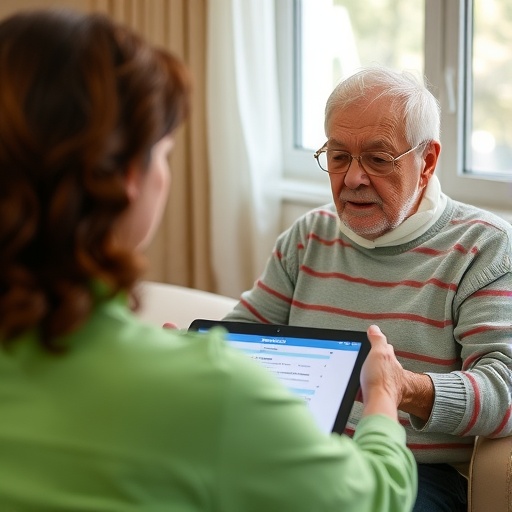In a rapidly advancing world, where technology continues to permeate every aspect of our lives, remote healthcare has emerged as a crucial avenue for supporting vulnerable populations. Among these groups, older adults, particularly those with a history of falls, stand to benefit significantly from innovative approaches that allow for safe, effective assessment of functional physical performance. A recent study, conducted by a team of researchers led by de Melo et al., highlights how remote adaptations of physical performance tests can maintain their reliability, ensuring that essential evaluations continue unabated, even in a virtual landscape.
The increasing prevalence of falls among the elderly underscores an urgent public health concern. Each year, millions of older adults experience falls, leading to serious health complications and decreased quality of life. As the world grapples with the implications of aging populations, the necessity for reliable and accessible assessment methods has never been greater. The adaptability of established physical performance tests into remote formats represents a promising solution to this pressing problem.
De Melo and colleagues focused on assessing the reliability of various functional physical performance tests, specifically tailored for remote execution. This involved reimagining traditional tests, which often require in-person supervision, into formats manageable from the comfort of the participant’s home. By utilizing technology, this research aims to bridge the gap often created by geographical barriers and limitations in mobility that many older adults face.
Significantly, the study explored familiar assessment tools such as the Timed Up and Go Test (TUG) and the Sit-to-Stand test. By transitioning these tests to a remote environment, the researchers could ensure that the participants still received a thorough evaluation while maintaining stringent standards of safety and effectiveness. It’s imperative to note that the integrity of these tests remained intact, meaning that results could be interpreted with confidence, similar to in-person assessments.
One compelling aspect of this study is the emphasis on participant engagement through remote modalities. The researchers utilized user-friendly technologies, allowing for video calls and real-time guidance during the tests. This not only provided older adults with the necessary supervision but also fostered an element of social interaction, which has proven beneficial for mental health. Therefore, while the primary aim was to assess functional mobility, the secondary advantage of enhancing social connectedness cannot be overstated.
The findings of this research hold significant implications for healthcare providers and policymakers alike. By validating these remote assessment methods, the potential for widespread adoption becomes palpable. Moreover, it aligns with the broader trends toward digital health solutions, emphasizing the need to refine healthcare delivery systems for older populations. Educating healthcare providers on these new methodologies ensures that they can effectively implement remote performance assessments.
Furthermore, the implications of this research extend beyond mere fall prevention. Emphasizing a proactive approach to elder care, the study reinforces the importance of physical performance as an indicator of overall health. By implementing regular remote assessments, healthcare providers can monitor changes in mobility, strength, and balance over time, facilitating timely interventions that enhance the quality of life for older adults.
As healthcare systems worldwide continue to adapt to the realities of post-pandemic life, studies like that of de Melo and colleagues serve as beacons of innovation. The blending of technology and geriatric care marks a significant shift in how we approach healthcare, moving away from reactive strategies toward more preventive, accessible, and personalized care.
Moreover, embracing technology in this context aligns with the urgent need for inclusivity. Many older adults are digitally savvy, and as more individuals become proficient with technology, the potential for remote health assessments grows exponentially. This shift in paradigm not only benefits individuals but also alleviates some of the burdens on healthcare systems, which are often strained by the growing elderly population.
In conclusion, the remote adaptation of physical performance tests heralds a new era of flexibility in elder care. The comprehensive study conducted by de Melo et al. not only reaffirms the reliability of these methods but also underscores the importance of maintaining health initiatives that cater to the aging demographic. Through innovative solutions, it is possible to elevate the standards of geriatric care and safeguard the well-being of individuals who are often overlooked.
As awareness spreads regarding the feasibility and effectiveness of remote assessments, there is significant potential for these practices to become integrated into routine healthcare for the elderly. This paradigm shift promises to not only enhance functional capabilities among older adults but also to empower them to remain active participants in their healthcare journey. The continuing evolution of remote health solutions will undoubtedly play a pivotal role in shaping healthier, more resilient aging populations in the years to come.
Subject of Research: Reliability of functional physical performance tests adapted in a remote format for older people with a history of falls.
Article Title: Reliability of functional physical performance tests adapted in a remote format for older people with a history of falls.
Article References:
de Melo, M.L., Pelicioni, P.H.S., Dias, A.L.O. et al. Reliability of functional physical performance tests adapted in a remote format for older people with a history of falls.
Eur Geriatr Med (2025). https://doi.org/10.1007/s41999-025-01309-6
Image Credits: AI Generated
DOI: https://doi.org/10.1007/s41999-025-01309-6
Keywords: Remote assessments, elder care, falls, physical performance tests, telehealth, healthcare technology, geriatric care, mobility, health interventions, digital health solutions.




